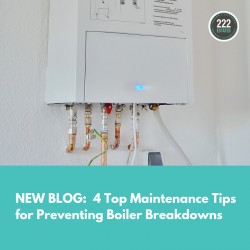
‘Tis the season to be jolly, but it’s also the season for frozen pipes. Nobody wants a boiler breakdown, especially at this time of year; costly bills before Christmas and no hot water is something we could all do without! So, to help you prevent this unwelcome problem, here’s our top 4 maintenance tips for preventing boiler breakdowns this winter.
1. Bleed your radiators
If you’re starting to notice that some radiators are taking longer to heat up or that they're hot at the top and cool at the bottom, it could mean that there’s excess air in them and they need to be bled.
It’s usually recommended that radiators are bled once a year but its a job that’s often overlooked in the home. To ensure your heating system is running as effectively as possible, take the following steps:
How to bleed your radiators:
-
Firstly, make sure your central heating is turned off to avoid boiling water from spraying out during the process
-
Find an old rag or cloth and a radiator key
-
Use a plastic sheet to cover your carpet and protect it from any leaks
-
Take your radiator key, place it in the valve and turn it slowly anti-clockwise for a quarter turn
-
Listen out for a hissing noise which will indicate that air is coming out
-
When the hissing stops, water will start to come out of the valve which will signal that all of the air has escaped
-
Close the valve by turning it clockwise for a quarter turn
-
When you switch on your heating again, check that the radiator is hot at the top and bottom which will indicate that is has been successfully bled.
2. Check your boiler pressure
When your boiler is on, look for the pressure gauge and check that it is between 1 and 1.5 bar. Boilers don’t run properly and risk breaking down when the pressure is too low. If yours is below 1, take a look at this helpful video on how to adjust it.
3. Lag your pipes
If you have insulated the floor of your loft, it will keep your home warmer by trapping the heat below. However, in doing this, the loft will be left significantly cooler and, in winter months, can lead to any pipes up there freezing.
Lagging your pipes is a simple and cheap way to prevent this. It basically means to insulate pipe work and is done with foam tubes which can be found at most hardware shops. Here’s a video which demonstrates how it's done.
4. Check for ventilation and any leaks
In order to function effectively, boilers need adequate ventilation. If yours is in a cluttered cupboard amongst shoes and jackets, you could be causing some damage. Make sure that you boiler is in a clear space with plenty of free room to breathe.
Leaks can also be a sign of boiler malfunction so check the overflow pipe (located outside your home) to see if there is any dripping. This can be a sign of a faulty pressure valve or that the boiler is overfilling. If this is the case, you will need to call an engineer to get it fixed.
Don’t carry out your own boiler repairs
If you do spot something faulty or find that your boiler isn’t working as effectively as it should, it’s important that you call an engineer as soon as possible. The longer you leave it, the worse and more costly the problem can become.
When booking in an engineer, always check that they are Gas Safe Registered.
To sum up
By taking the above steps and keeping an eye on your boiler, you’ll help to ensure it’s running as efficiently as possible. It will also help you to spot any potential issues and get them sorted before any costly damage occurs.



